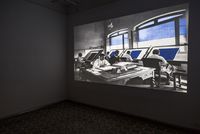Based in New Delhi, Raqs Media Collective comprises three practitioners: Jeebesh Bagchi, Monica Narula, and Shuddhabrata Sengupta. For the past three decades, the Collective has been concerned with urbanism, epistemology, technology, globalisation, and the experience of time. Drawing upon critical theory and political philosophy, their work is marked by active inquiry, double-meanings, pluralism, and entanglement.
Read MoreAll born in New Delhi, Bagchi, Narula, and Sengupta studied at the city's Mass Communications Research Centre at the Jamia Milia Islamia university, and formed Raqs Media Collective in 1992, following their graduation. They took their name from the Persian, Arabic, and Urdu word for the meditative state attained by whirling dervishes, which doubles as an acronym for 'Rarely Asked Questions'.
While they began by making documentary films in the 1990s, Raqs Media Collective's present-day output takes the form of installations, films, photography, web art, texts, public interventions, exhibitions, and conferences. Many projects use commonplace materials, speculative writing, and existing modes of display to examine the complexities of globalisation.
In 2004, the group collected everyday objects from the streets and people of Brussels and laid them out on the floors of the city's Palais des Beaux-Arts to resemble the aftermath of an archaeological dig (The Wherehouse). The Collective imagined stories about the objects as they might pertain to the lives of undocumented migrants in the European Union, which were presented in labels, wall texts, and recorded conversations.
Simple objects were mobilised again in the project With Respect to Residue (2004), when Raqs distributed 10,000 paper placemats to restaurants and cafés around Liverpool. Printed on the placemats were maps of the world overlain with images of food detritus and text about waste, memory, and forgetting.
In other works, departing from 'low-brow' materials, Raqs Media Collective appropriates aesthetics normally associated with power. For the 56th Venice Biennale (2015), the Collective presented Coronation Park (2015): nine sculptures that resembled imperial statuary and referenced the 1911 coronation of the British monarchs as emperor and empress of India.
Plaques on the Coronation Park sculptures were engraved with quotes from George Orwell's 1936 anti-imperialist essay 'Shooting an Elephant'. That the sculptures were made with oil-based tar and petroleum-based wax was in part a nod to global capitalism's reliance on environmental exploitation.
Responding to a call for commissions for the Fourth Plinth at Trafalgar Square, Raqs Media Collective presented the The Emperor's Old Clothes (2017)—a natural extension of Coronation Park. White, ghostly, and mounted on a plinth, the fibreglass-and-resin sculpture depicted regal-looking robes without a body beneath, pointing to the posturing of power and the inevitability of abdication.
Fluid language and double-meanings are mainstays of the Collective's work. The title of the steel text sculpture More Salt in Your Tears (2010) referred to the salinity of the Baltic Sea, which at the time was lower than that of human tears. However, the group noted, given the effects of unchecked global warming, those levels might change.
Made from hundreds of light bulbs, the large-scale sculpture Revoltage (2011) alternatively illuminated the words 'Revolt' and 'Voltage'. First installed at the Headquarters of French Communist Party in Paris, the work's play on words drew connections between technology, power, and uprising.
The sculpture The Course of Love (2019) also played on doubling. Using faceted lenticular panels, Raqs formed a large-scale replica of a simple folded paper boat, which was placed in a real boat and left to drift down a stream for the 2019 Setouchi Triennale. The work expressed a simple, romantic sentiment; as the Collective described on their website, 'A real boat cradles an "ideal" boat. Just as a moment in life cradles a drifting idea. Love is held by the memory of love.'
The 2009 installation Escapement at Frith Street Gallery in London was similarly concerned with affect. For Escapement, Raqs presented 27 clocks, each set to a particular city's time zone. However, instead of numbers, the clock hands pointed to feelings such as fear, guilt, nostalgia, ecstasy, and panic.
Writing, research, and textual production is central to the Collective's practice. In 2000, the group co-founded the Sarai programme and the Sarai Reader series at the Centre for the Study of Developing Societies in Delhi. Raqs often publishes texts on subjects including technology, the relationships between memory and photographic archives, urbanism, and—as in the 2010 e-flux essay 'Now and Elsewhere'—contemporaneity, disappearance, and escape.
Above all, Raqs' work is characterised by vigorous multi-disciplinary collaboration and inquiry—a spirit that extends to their curatorial practice. In 2016, Raqs Media Collective curated the 11th edition of the Shanghai Biennale, titled Why Not Ask Again: Arguments, Counter-arguments, and Stories (2016).
The Biennial—as described by Ocula Magazine contributor Srinivas Aditya Mopidevi—aimed to 'bring into play a panoply of vantage points, itineraries, and imaginaries.' In conversation with Ocula, Raqs explained that their curatorial mission for the Biennial was to both 'expand into the city' and 'thicken the experience of time in the exhibition.'
This diffusive rethinking of the biennial format was accomplished firstly by the '51 Personae' project, which, in collaboration with Chen Yun, engaged young artists, teachers, and researchers at a local mutual-aid society to 'create scenarios emerging from their desires, fantasies and aspirations to make gatherings.'
Secondly, the Collective worked with Liu Tian and Yao Mengxi on an experiment called 'Theory Opera', which drew on 'academic research, performative procedures, music, and improvisational display modes' to 'turn the exhibition space into a site for an experiment on what [the Collective] term[s] the "sensation of thought".'
Raqs Media Collective lives and works in New Delhi.
Elliat Abrecht | Ocula | 2021

